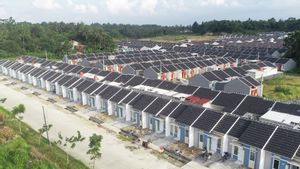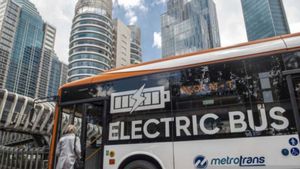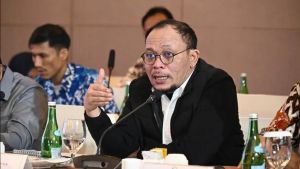JAKARTA - The Ministry of Public Works and Public Housing (PUPR) cooperates with the World Bank in realizing the Extreme Poverty Elimination program in Indonesia, one of which is through improving the quality of uninhabitable houses in a number of areas.
Director General of Housing of the Ministry of PUPR Iwan Suprijanto in a written statement in Jakarta, Wednesday, October 26, stated that his party continues to follow up on Presidential Instruction (Inpres) Number 4 of 2022 concerning Accelerating the Elimination of Extreme Poverty and also improving the quality of uninhabitable houses through the implementation of the National Affordable Housing Program (NAHP) for Self-Help Housing Stimulant Assistance.
Iwan revealed that one of the locations for its implementation was in Tangerang Regency, Banten as many as 564 housing units with an aid value of Rp11.28 billion.
"The acceleration of the elimination of extreme poverty is one of the government's main priorities," he said, quoted from Antara.
Iwan emphasized that the government and the World Bank want the Extreme Poverty Elimination program in Indonesia to run well, one of which is by distributing the Self-Help Housing Stimulant Assistance Program (BSPS) to help improve the quality of uninhabitable houses for the poor.
Director of Swadaya Houses of the Directorate General of Housing of the Ministry of PUPR, KM Arsyad explained that the NAHP BSPS Program is very much needed to help people to own decent houses. The existence of livable houses is expected to improve welfare and encourage people to live a healthy life with their families.
Arsyad also stated that he had visited the recipients of the BSPS assistance in the framework of the 14th NAHP Support Mission in Cipaeh Village, Gunung Kaler District, Tangerang Regency, Banten.
Head of the NAHP Project Implementation Unit (PIU), Chandra RP Situmorang, explained that in the implementation of the BSPS program in Tangerang, his party encouraged the realization of program integration and collaboration with various stakeholders such as the Regional Government and Baznas, to improve the quality of houses for the poor to become more habitable as many as 19 units.
"We obtained data on aid recipients for handling extreme poverty from the BKKBN. Then we followed up with verification based on name and address or by name by address to ensure the accuracy of the target recipients of assistance in accordance with program criteria," said Chandra.
Practice Manager, Urban Resilience and Land Practice of the World Bank, Ming Zhang explained, from the results of this field visit, his party assessed that the implementation of the NAHP BSPS was right on target, namely targeting the poor, while improving the quality of houses was needed so that they could have a habitable place to live.
"We are very satisfied and assess that the results of the development through the NAHP BSPS Program are right on target. In addition, we hope that this program can continue and can bring many benefits to the Indonesian people and help the government reduce extreme poverty," he hoped.
The English, Chinese, Japanese, Arabic, and French versions are automatically generated by the AI. So there may still be inaccuracies in translating, please always see Indonesian as our main language. (system supported by DigitalSiber.id)








